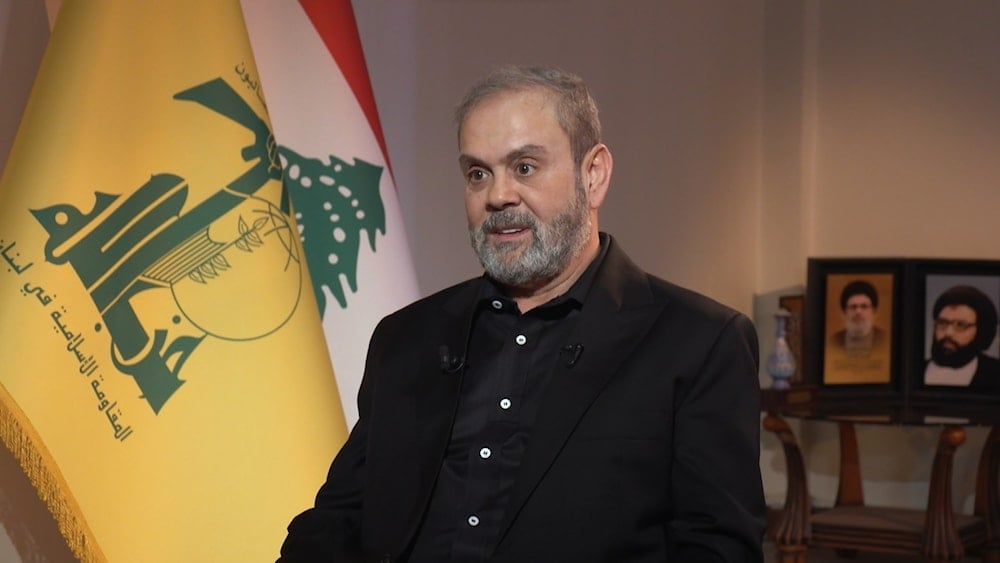Tehran never interferes in Hezbollah decisions: Representative in Iran
Hezbollah’s representative in Iran, Sayyed Abdullah Safieddine, affirms Tehran supports the Resistance but never interferes in its military or political decisions.
-

Hezbollah's representative in Iran, Sayyed Abdullah Safieddine, during an interview with Al Mayadeen, which aired on October 6, 2025 (Al Mayadeen)
In an exclusive interview with Al Mayadeen Chairman of the Board of Directors, Ghassan Ben Jeddou, Hezbollah’s representative in Iran, Sayyed Abdullah Safieddine, spoke about the movement’s internal organization, its leadership continuity under Sheikh Naim Qassem, and its steadfast relationship with the Islamic Republic of Iran.
Safieddine underscored that Iran has never interfered in Hezbollah’s operational or military decisions, reiterating that “His Eminence, the Leader of the Islamic Revolution, never intervened in any military action. He always considered Sayyed Hassan Nasrallah the sole decision-maker in such matters.”
He recalled that during the July 2006 war, “When the Zionist enemy launched its aggression against Lebanon, His Eminence was in the holy city of Mashhad. He summoned the National Security Council and senior officials and told them the war had begun. He instructed them: ‘Go and ask Sayyed Hassan and Hezbollah what they need for survival, continuity, resistance, and victory.’”
Safieddine added that the leader “did not question or intervene in Hezbollah’s decisions” but ensured that Iran fully mobilized its resources to assist Lebanon during the war.
“I testify personally that Sayyed Khamenei convened the National Security Council, and the entire Iranian state transformed into a support force for Hezbollah,” he said. “Ministers and officials contacted me, asking what was needed in healthcare, civil defense, and housing. Every sector was mobilized to help.”
‘Israeli aggression yielded no results’
Reflecting on recent developments, Safieddine asserted that despite ongoing hostilities, the Zionist entity has failed to achieve any tangible results. “Anyone observing the situation today can see that the institutions that have risen again, be they regulatory, jihadist, media, political, and cultural, demonstrate that the enemy’s aggression has been fruitless,” he stated.
He emphasized that attacks targeting leaders and symbols of Resistance movements in Lebanon, Palestine, Yemen, and Iran “have had no effect” and “will never have an effect.” Safieddine added that “even within the Zionist entity, there is growing acknowledgment of failure. They have assassinated leaders but failed to destroy the movements themselves.”
“This resurgence of institutions and popular support has expanded the space for hope,” he said, noting a “global popular and political awakening against this entity.”
Iran wants to defend the region
Addressing speculation about Iran’s role in Lebanon, Safieddine clarified that Tehran’s objective “has always been for the Lebanese to protect themselves; nothing more.” He explained, “Iran never entered Lebanon with the intention of building influence, bases, or entities. It sent a small group during the early years of the Resistance for training and today maintains only advisors, as any country does.”
He stressed that Iran’s view remains clear, “All the problems of the Islamic world stem from the Zionist entity and its Western protectors. This entity’s harm is not confined to Palestine; it has extended across the region, even reaching Iran before the victory of the Islamic Revolution.”
Citing recent statements and maps presented by the Israeli Prime Minister, Safieddine said they reveal “the enemy’s desire to control the entire region.” He added that for Iran, “anyone participating in confronting this aggression is a friend, brother, and ally.”
A relationship built on trust
Safieddine described the bond between Sayyed Hassan Nasrallah and Sayyed Ali Khamenei as “one of complete trust and brotherhood, far stronger than a relationship between a father and son.”
He noted that “the leader feels reassured before and after Sayyed Nasrallah’s visits to Iran” and confirmed that a private meeting between the two took place during the COVID-19 pandemic.
He concluded by reaffirming, “I testify from my position as Hezbollah’s representative in Iran that, until this very moment, Iran has never asked anyone in Hezbollah, no member, no leader, no institution, for any service related to Iran itself. What Iran offers is support to those who defend their people and their dignity.”

 4 Min Read
4 Min Read










